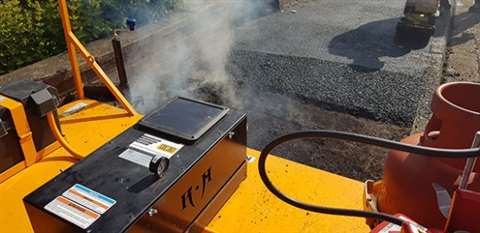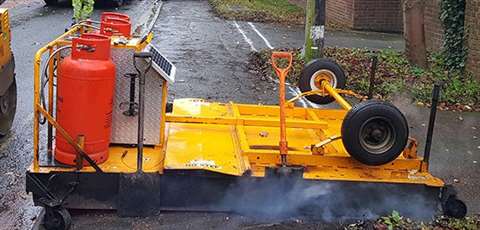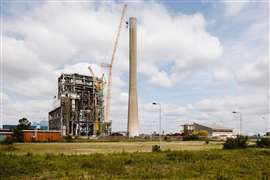How infrared tech can be used to repair road defects
17 January 2022

VolkerHighways has trialled a new infrared technology that has been designed for the repairing of defects in pavements and roads.
The technology was used to repair the north footway of the A30, which runs for 284 miles from London to Land’s End in England, near the village of Sunningdale in the Royal Borough of Windsor & Maidenhead, located just outside the M25 motorway.
Described as a “sustainable and efficient way” to repair pavement and road defects, the infrared technology works by heating up the existing area of defective asphalt to a temperature of 170 degrees Celsius.
According to VolkerHighways - a subsidiary of multidisciplinary construction contractor VolkerWessels UK, the asphalt can then be reworked using hand tools, and reused before a rejuvenator is added to the heated asphalt, along with any additional material as required.
“As a result, the materials ‘fuse’ together, eliminating the risks associated with ‘cold’ joints and the potential failure of the adjacent pavement. Lastly, the area is reprofiled, so that it is level, and compacted,” said VolkerHighways.
“The treatment increases the durability of the repairs, by eliminating weaknesses created by additional joints in the surface, giving it a longer lifespan.”

Carried out in partnership with the Royal Borough of Windsor & Maidenhead, the successful trial has led to the infrared repair method being added as an approved road treatement option within VolkHighway’s services agreement with the local authority.
Councillor Gerry Clark, cabinet member for transport and infrastructure, said, “This process is more energy-efficient, is less labour intensive, resulting in greater productivity, and reduces the need for excavation, making it safer and easier for access requirements.
“It is also more environmentally friendly, with zero materials waste and delivers carbon savings compared to traditional construction.
He added, “There are also benefits for residents, with less noise and vibration, no dust and fewer people working on site.”
According to VolkerHighways, which also recently completed three phases of the redevelopment around Maidenhead train station and town centre, the infrared technology is just on of a number of new low-carbon options being explored through its partnership with the Windsor & Maidenhead local council.
Kunle Kolaru, operations director for VolkerHighways, said, “As part of the ongoing focus on sustainability, VolkerHighways and the council teamed up to explore how new, environmentally-friendly initiatives can be employed around the borough.
“This has already included trialling a new electric road sweeper in Windsor, the first of its kind to be commercially available in the country, to accompany the three fully electric vans already in use for highway inspections.
Kolaru added, “We are also recycling material gathered during gully cleansing, so that it can be repurposed. In addition, we completed patching repairs on manhole covers on Castle Hill roundabout in Maidenhead, as part of an innovative mastic asphalt repair system trial.”
STAY CONNECTED


Receive the information you need when you need it through our world-leading magazines, newsletters and daily briefings.
CONNECT WITH THE TEAM











